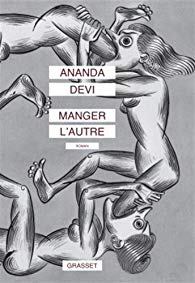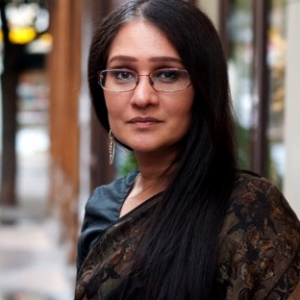Manger L’Autre, a novel by Mauritian writer Ananda Devi
 Ananda Devi’s new novel, Manger l’autre, is a tale of excessive consumption, an allegory of our society obsessed with body image and consumerism. With humor and wit, she exposes the taboo of body dysmorphia and obesity and shows the protagonist mirroring our world in a violent and absurdist way.
Ananda Devi’s new novel, Manger l’autre, is a tale of excessive consumption, an allegory of our society obsessed with body image and consumerism. With humor and wit, she exposes the taboo of body dysmorphia and obesity and shows the protagonist mirroring our world in a violent and absurdist way.
A girl trapped in her body
The novel concerns a teenage girl, who is born obese, and eats, grows and isolates herself. She weighs more than ten kilos at birth and tears her mother in every sense of the word. Her mother runs away, horrified by her child. Her classmates photograph her tirelessly to feed the big eye of the Internet. Her father, convinced that she has devoured her twin in utero, cooks for hours to feed "his princesses". He then feels nauseated by the child's insatiable need for food. The girl is cloistered at home, almost unable to move, trapped in her expanding body and the solitude it implies. Alone, frightened by this monstrous body, she tries to understand who she really is. When she accidentally encounters love and experiences other pleasures of the flesh, she finally seems to be able to accept herself. But does the ordeal have an end for "different" beings?
The novel conjures up images of Rabelais’ Gargantua, with excess and greed as irrevocable bedfellows. The end of the novel reaches peaks of cruelty and horror caused by the sacrificial excesses demanded by our society intent on being entertained.
Exclusion and otherness
Ananda Devi's work is witty, yet tragic. Haunted by the issues of exclusion, otherness, deviance and suffering, she denounces the stifling climate of a society with multiple divisions. In her novels, she stands up against rejection and speaks for the recognition of otherness.
Postcolonial Mauritius
Despite her poetic use of language, Devi’s depiction of the Mauritian island has a raw realism to it. She herself claims to be among the first to present the reality of Mauritius as it is. Her novels present the dark reality of the postcolonial island whose infrastructure is on the verge of collapse and reveals the claustrophobia and insularity of the island. She presents an inhuman space limited not only by its geography, but also by the poverty, suffering, and misery that grip her characters so unrelentingly. Devi’s young Mauritians belong to marginalized strata of society and live with the cultural diversity inherent in the island. They circulate within diverse cultures and territories, continually attempting to escape from fixed definitions and rigid beliefs, and by so doing, redefine notions of identity and belonging.
Biography
Of Andhra Pradesh descent, Ananda Devi was born at Trois-Boutiques, Mauritius (March 23, 1957). At the age of 15, she won a prize in a Radio France Internationale short story competition. She went on to study at the School of Oriental and African Studies in London, where she obtained a PhD in Social Anthropology.
Books
In 1977, she published a collection of short stories, Solstices. After spending several years in Brazzaville in the Congo, she moved to France in 1989, the same year in which her first novel Rue la poudrière was published. This was followed by more novels: Le Voile de Draupadi in 1993, L’Arbre fouet in 1997 and, in 2000, Moi, l'interdite, which received the Prix Radio France du Livre de l’océan Indien. Her novel, Eve de ses décombres, won the Prix des cinq continents de la Francophonie in 2006, as well as several other prizes. It was also adapted for the cinema. In 2007, Devi received the Certificat d’honneur Maurice Cagnon du Conseil International d’Études Francophones. She has since won other literary prizes, including the Prix du rayonnement de la langue et de la littérature française of the Académie Française. In 2010, she was made Chevalier des Arts et des Lettres by the French Government. Les hommes qui me parlent, an autobiographical novel, was published in 2011.
Ananda Devi has published 13 novels as well as short-story collections and poetry, and has been translated into several languages. The African Studies Centre’s library has over ten of her works, most are in the original language.
Angela Robson

